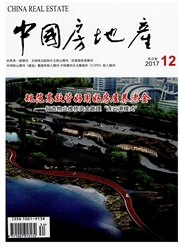

 中文摘要:
中文摘要:
在普适性国际化风险研究文献的基础上,以开展国际化经营的中国房地产企业为案例,深度剖析在房地产开发建设和营销两个不同阶段下,中国房地产企业面临的国际化风险及其采用的风险管理措施。案例研究结果表明:房地产开发建设阶段下,宏观环境风险和部分行业风险(如技术标准)影响整个项目在东道国市场的合法性,进一步影响其在东道国市场的持续生存;部分行业风险(如竞争风险和产品市场风险)和企业风险主要影响到项目的设计、资金、成本和工期等具体问题,对项目能否在东道国市场取得市场效益有重要影响。房地产营销阶段下,宏观环境风险、行业风险(如竞争风险)和意外风险对消费者的态度、购买意向和国际投资计划产生重要影响;企业风险(如人才胜任力不足)会影响到营销策略的应用和意向客户的转化率等。
 英文摘要:
英文摘要:
This paper sets out to discuss risk management in the internationalization process ofChinese real estate enterprises,using the method of case study.We identify the risk which exists inthe two processes,including the stage of development and construction and the stage of marketing.And we find that(1)in the stage of development and construction,macro environmental risk andindustrial risk(e.g.technical standard)pose an impact on the legitimacy of the internationalproject which will influence its persistent existence;industrial risk(e.g.competitive risks)andbusiness risk have an effect on the design,finance,cost and duration of the project etc.,which willinfluence its economic benefit;(2)in the stage of marketing,macro environmental risk,industrialrisk(e.g.competitive risks)and accident risk may have influence on the attitude,purchase intentionand international investment plan of the customers;business risk(e.g.shortage of talents)may havean effect on the adoption of marketing strategies and conversion rate of the interested customers.Besides,we find that risk management(e.g.high-status affiliation and brand building)before therisk happens can control the negative effects of the risk effectively for Chinese real estateenterprises.
 同期刊论文项目
同期刊论文项目
 同项目期刊论文
同项目期刊论文
 期刊信息
期刊信息
